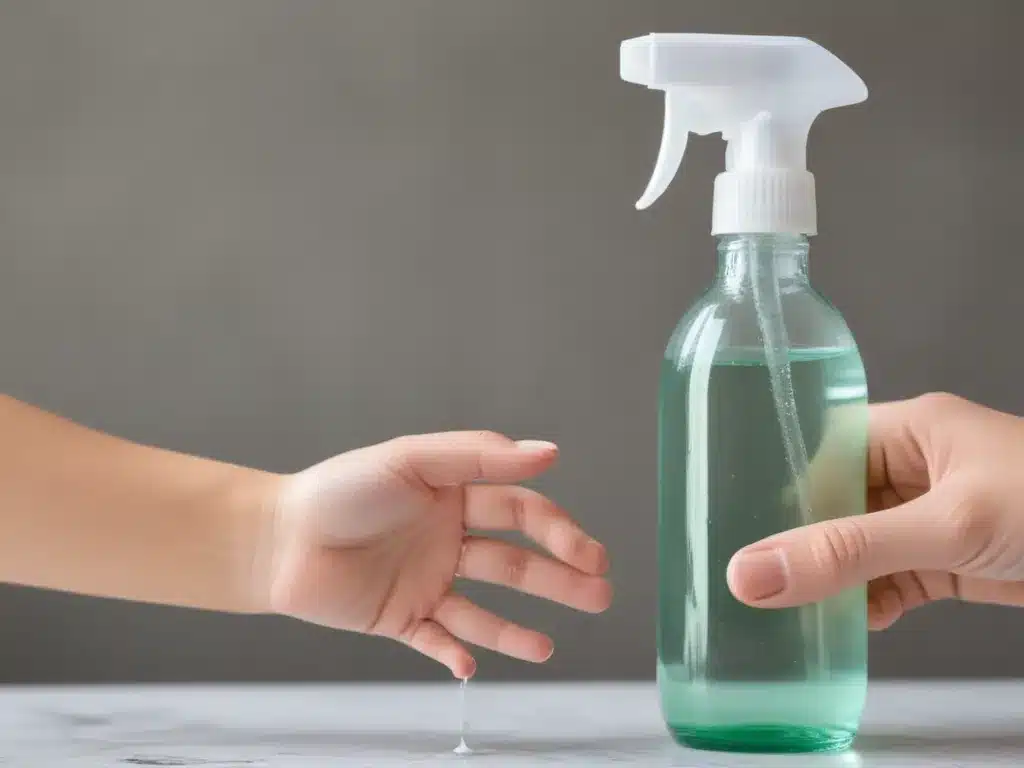Introduction
We all want a clean and hygienic living environment, but many commercial disinfectants contain harsh chemicals that can be harmful to our health and the environment. That’s why I’m excited to share with you some homemade disinfectant sprays that are effective at killing germs while being safe for you and your family. These natural alternatives are not only cost-effective but also eco-friendly and easy to make with ingredients you likely already have in your kitchen.
The Power of Natural Ingredients
When it comes to disinfecting, we often think that stronger chemicals are better. However, many natural ingredients have powerful antimicrobial properties that can effectively combat bacteria, viruses, and other pathogens. Let’s explore some of the key ingredients in our homemade disinfectant sprays and their impressive germ-killing abilities.
Vinegar
Vinegar – is a versatile cleaning agent that has been used for centuries. Its primary active ingredient, acetic acid, can kill a wide range of microorganisms, including E. coli, salmonella, and even the dreaded norovirus. The acetic acid in vinegar disrupts the cell membrane of bacteria, causing them to die.
Essential Oils
Essential oils – are concentrated plant extracts that have been used for their medicinal properties for thousands of years. Many essential oils, such as tea tree, lavender, eucalyptus, and thyme, have potent antimicrobial properties that can kill various types of bacteria, viruses, and fungi. These oils work by damaging the cell walls and disrupting the metabolic processes of microorganisms.
Hydrogen Peroxide
Hydrogen peroxide – is a natural oxidizing agent that can effectively disinfect surfaces and kill a wide range of pathogens, including bacteria, viruses, and fungi. It works by producing free radicals that damage the cell membranes and DNA of microorganisms, preventing them from multiplying or surviving.
DIY Disinfectant Spray Recipes
Now that we understand the power of natural ingredients, let’s dive into some easy-to-make disinfectant spray recipes that you can use around your home.
All-Purpose Disinfectant Spray
Ingredients:
– 1 cup white vinegar
– 1 cup water
– 20 drops tea tree essential oil
– 10 drops lemon essential oil (optional for a fresh scent)
Instructions:
1. In a spray bottle, combine the vinegar and water.
2. Add the essential oils and shake well to mix.
3. Spray the solution directly onto surfaces and let it sit for a few minutes before wiping clean.
Hydrogen Peroxide Disinfectant Spray
Ingredients:
– 1 cup hydrogen peroxide (3% solution)
– 1/4 cup water
– 10 drops lavender essential oil (optional for a pleasant aroma)
Instructions:
1. In a spray bottle, combine the hydrogen peroxide and water.
2. Add the essential oil (if using) and shake well to mix.
3. Spray the solution onto surfaces and let it sit for at least 10 minutes before wiping clean.
Citrus Disinfectant Spray
Ingredients:
– 1 cup white vinegar
– 1/2 cup lemon juice (or orange juice)
– 10 drops tea tree essential oil
– 10 drops grapefruit essential oil (optional for added citrus scent)
Instructions:
1. In a spray bottle, combine the vinegar and citrus juice.
2. Add the essential oils and shake well to mix.
3. Spray the solution onto surfaces and let it sit for a few minutes before wiping clean.
How to Use Homemade Disinfectant Sprays
While these homemade disinfectant sprays are effective and safe, it’s important to use them correctly to ensure optimal results. Here are some tips:
-
Clean First: Before disinfecting, make sure to clean the surface thoroughly with soap and water to remove any visible dirt or grime. Disinfectants work best on clean surfaces.
-
Allow Contact Time: After spraying the disinfectant solution, let it sit on the surface for the recommended amount of time (usually a few minutes) before wiping it clean. This contact time is crucial for the solution to effectively kill germs.
-
Ventilate the Area: Some essential oils and vinegar have strong scents. Ensure proper ventilation by opening windows or using a fan to circulate the air while using the disinfectant sprays.
-
Avoid Mixing Chemicals: Never mix different cleaning products or chemicals, as this can create toxic fumes or dangerous chemical reactions.
-
Test on a Small Area: Before using the disinfectant spray on a larger surface, test it on a small, inconspicuous area to ensure it won’t cause any discoloration or damage.
The Benefits of Homemade Disinfectant Sprays
Beyond their effectiveness in killing germs, homemade disinfectant sprays offer several additional benefits:
-
Cost-Effective: Making your own disinfectant sprays can save you a significant amount of money compared to buying commercial cleaning products.
-
Eco-Friendly: These natural solutions are environmentally friendly and biodegradable, reducing your carbon footprint and minimizing the impact on our planet.
-
Gentle on Surfaces: Unlike harsh chemical cleaners, these homemade sprays are gentle on surfaces and won’t cause damage or wear over time.
-
Customizable: You can customize the scents and ingredients to suit your preferences or specific cleaning needs.
-
Safer for Families: With no harsh chemicals, these disinfectant sprays are safer for use around children and pets, providing peace of mind for families.
Conclusion
By incorporating these homemade disinfectant sprays into your cleaning routine, you can keep your home clean, fresh, and germ-free without compromising your health or the environment. Not only are they effective at killing germs, but they also offer cost savings, customizability, and a gentler alternative to harsh chemical cleaners. Embrace the power of natural ingredients and take control of your home’s hygiene with these simple DIY solutions.







